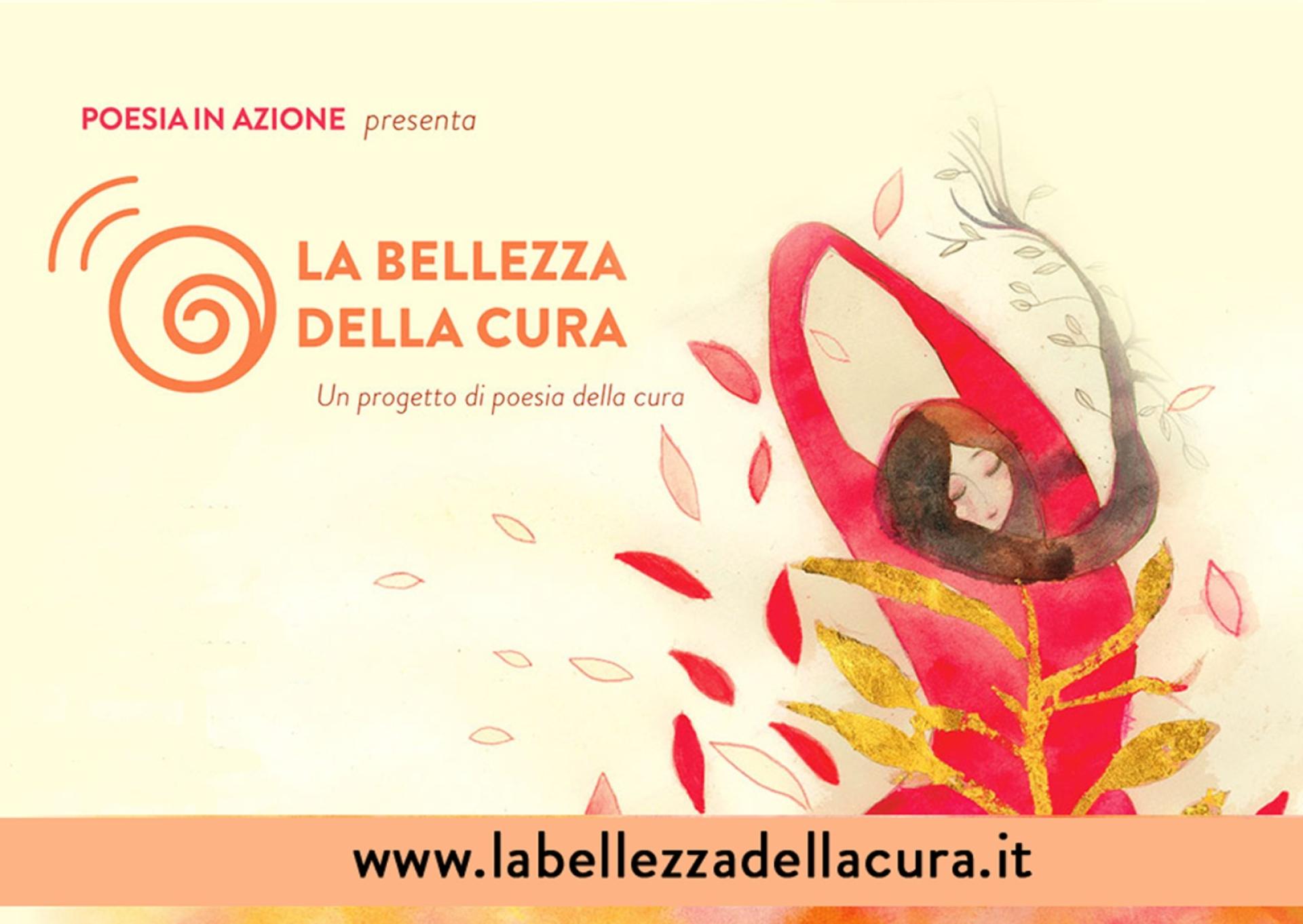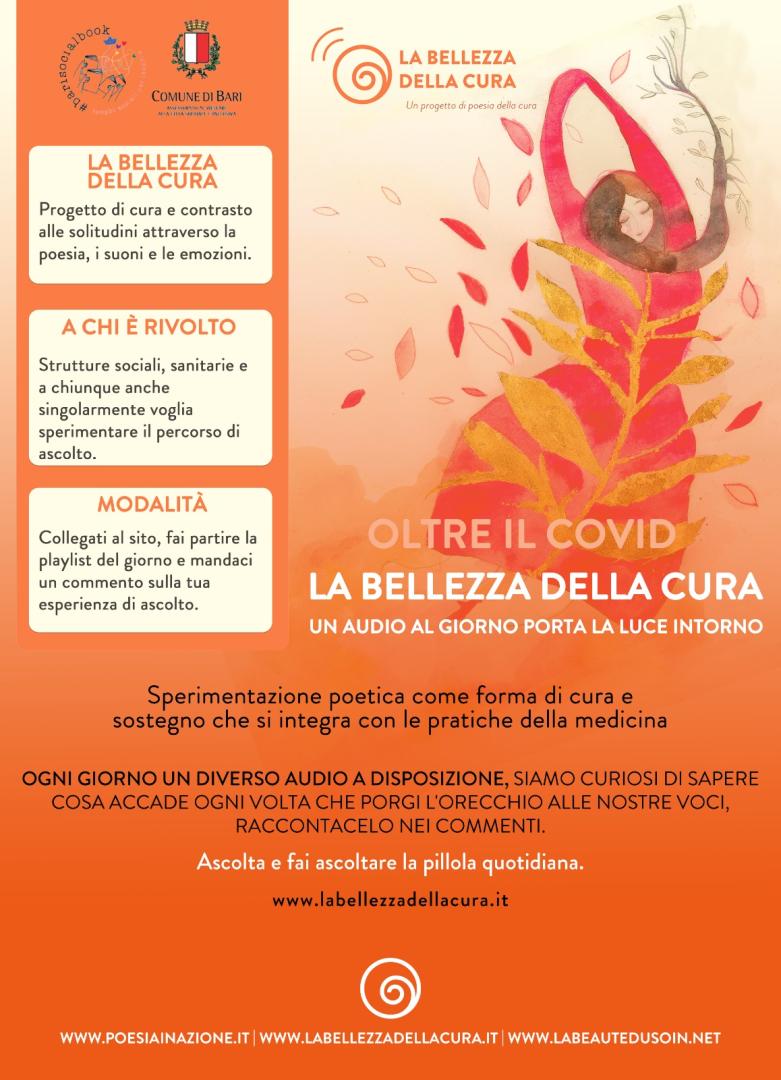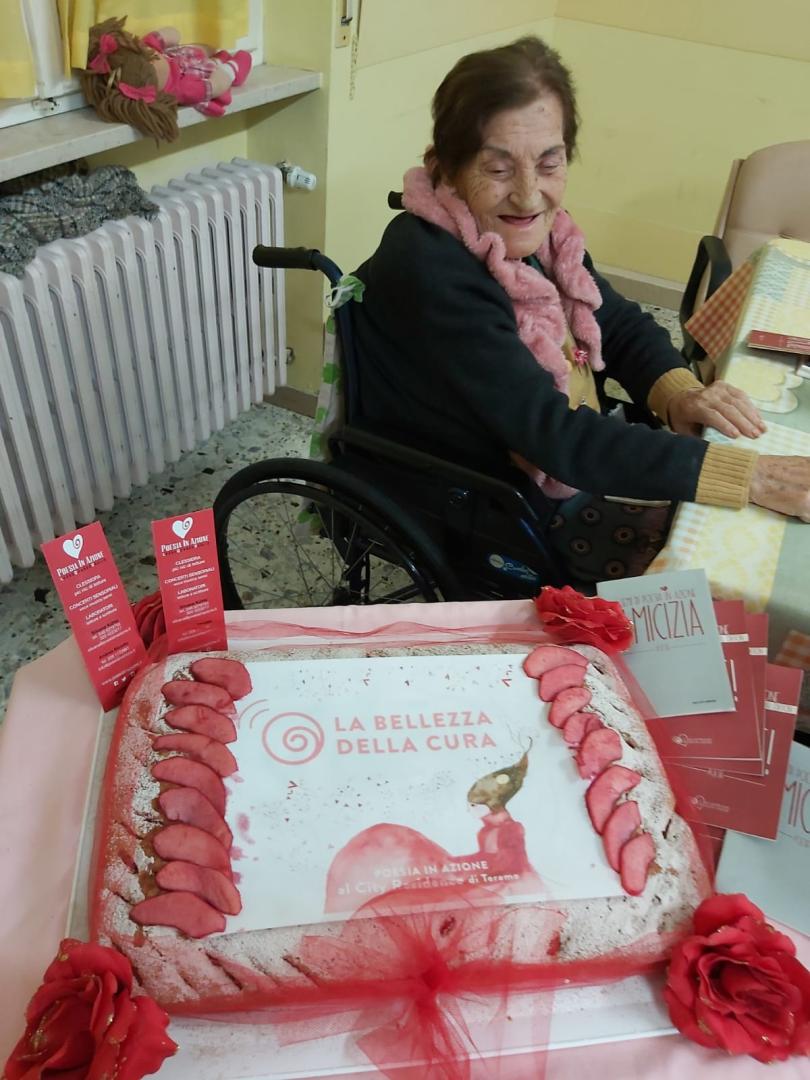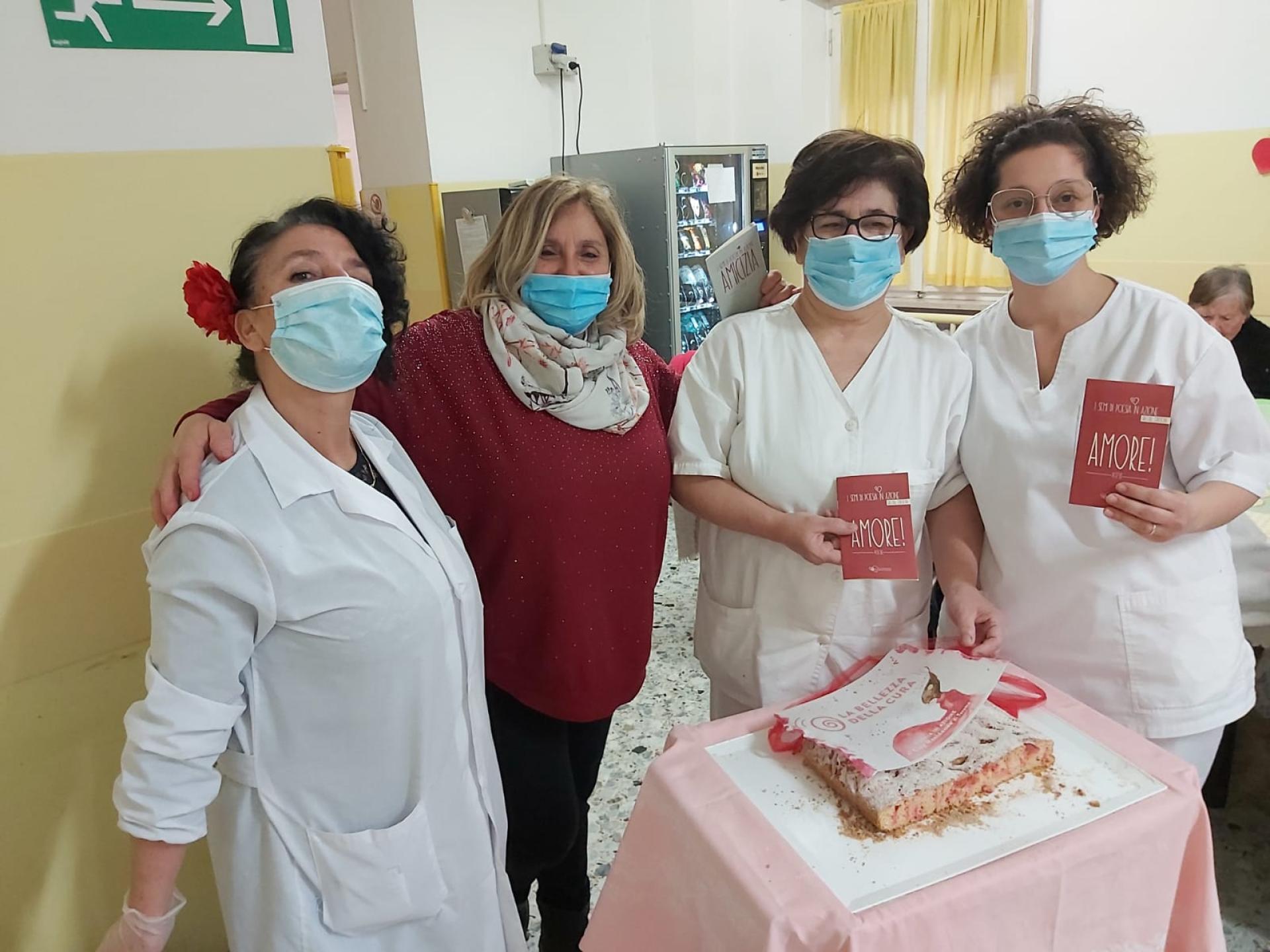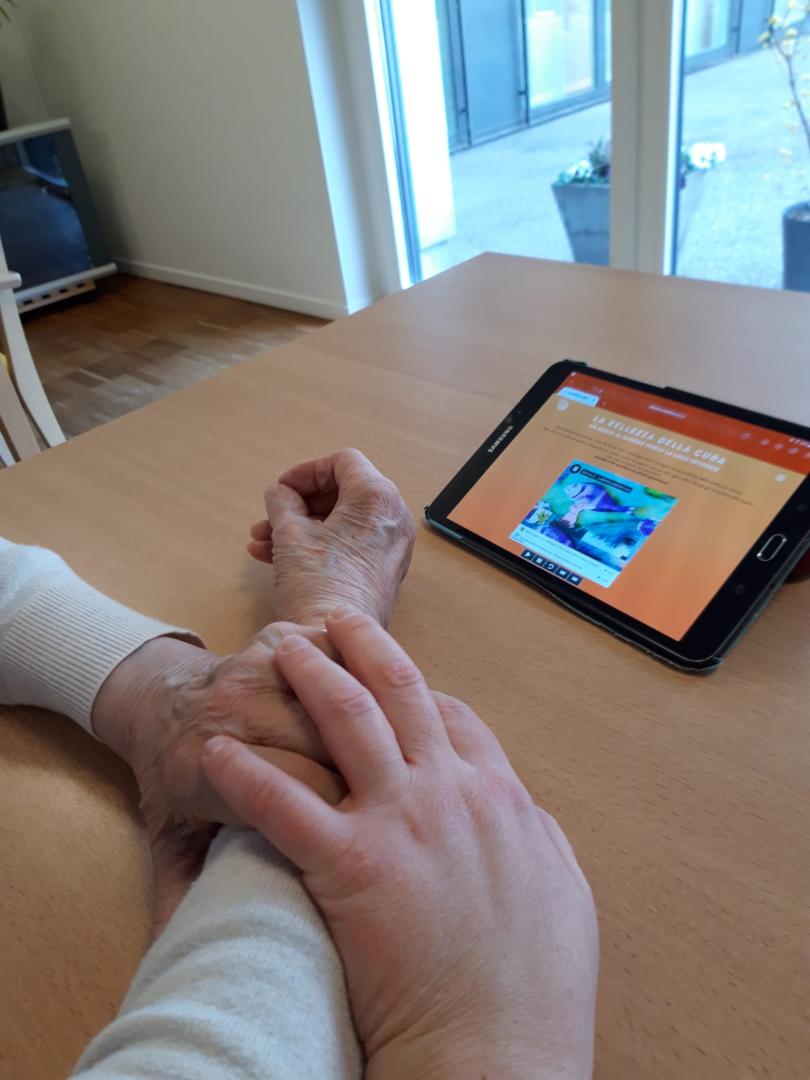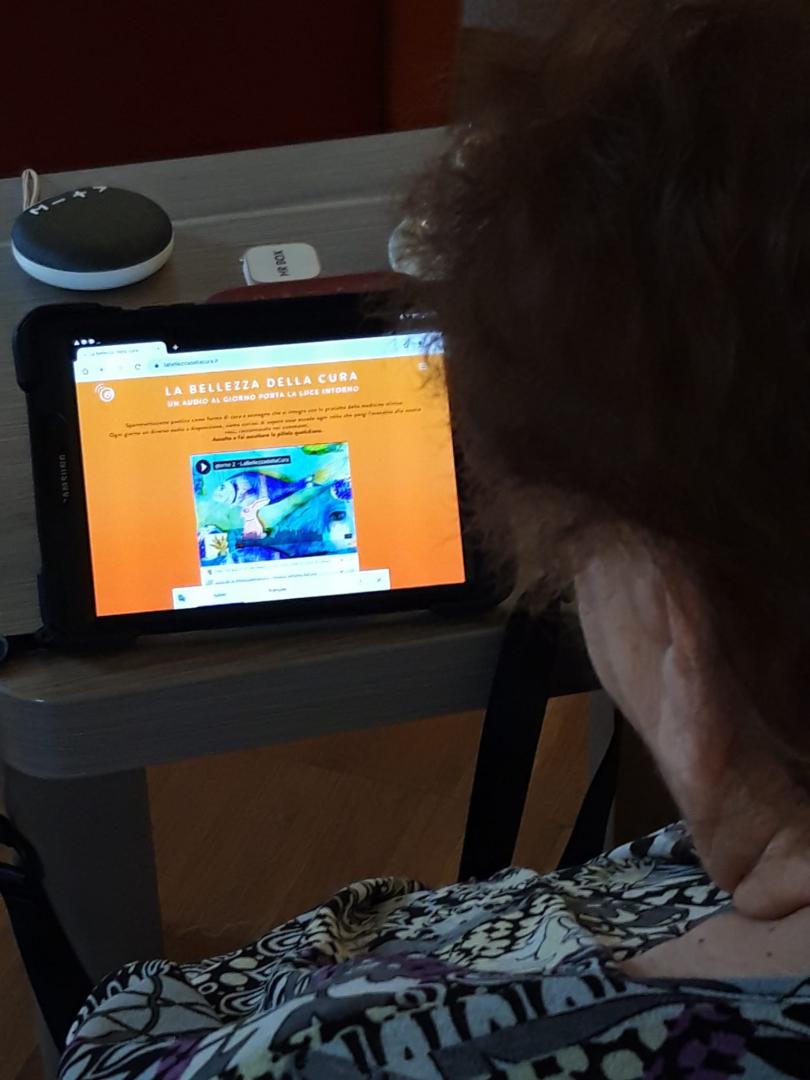The beauty of care
Basic information
Project Title
Full project title
Category
Project Description
The Beauty of Care, a poem a day lights up your way! Poetic experimentation as a form of care integrated with clinical medical practices, supports and enriches the lives of caregivers and patients. Web-based tool offers custom made audio poetry tracks for relaxation, care, and healing. Every day in Italian and French new tracks that comprise a few minutes of sounds/voices/words built/recorded specifically. The project comprises also training courses designed for medical doctors/caregivers.
Geographical Scope
Project Region
Urban or rural issues
Physical or other transformations
EU Programme or fund
Which funds
Description of the project
Summary
The Beauty of Care, a poem a day lights up your way! represents an extra tool in the healthcare worker’s toolbox for use in healthcare facilities, such as hospitals and retirement homes. Caregivers and patients can utilize the tool individually, or in a group, by following a few suggestions. Through our websites the project releases carefully crafted audio tracks different every day and designed to soothe, encourage, promote self care, and evoke memories, feelings, and images. The project website has Italian and French versions, labellezzadellacura.it and labeautedusoin.net.Our artists, poets, and musicians worked together to build customised audio tracks. Their work was fundamental.
We involve caregivers, patients, families, and citizens by asking them to listen, and respond to our daily dose of poetry/sounds tracks. The multidisciplinary work team chose to combine spoken word and music/sounds as a testament to the importance of the arts in preserving, transmitting, and sustaining culture, and fostering well being. With multiple studies that show the positive effect poetry can have in clinical, and other settings, the project authors also want to let users know that poetry can be used as a way of working through emotional issues, on-the-job stress, and feelings of isolation.
Poetry is one way in which many people, including patients and palliative care professionals, may seek meaning from and make sense of various illnesses and losses. The Beauty of care has potential for developing person-centred organisations, training health professionals, supporting patients and for promoting public engagement in palliative care. Mindful listening seemed to be specifically related to increasing relaxation and concentration, enjoyment, and improved emotion regulation. In the course of the year 2021 our method was tested and completed in different healthcare facilities.
The project comprises also training/education courses designed for medical doctors and caregivers
Key objectives for sustainability
The Beauty of Care is part of a generative process of new practices aimed at the promotion of linked values, such as listening, sharing, attention to, and respect of others, promote healthy lives, which through poetry contribute to transmission and enrichment of culture and well-being. As such, sustainability is central, Agenda2030 Goals 3, 4, 8 are amongst others core issues, in particular Ensure healthy lives and promote well-being for all at all ages. Our results show repeatedly that caregivers and patients both experience relief, and even joy through the shared experience of listening to a custom crafted poetry audio track. The powerful effect of sounds and music combined with poetry brings both caregivers - previously trained - and their patients into harmony with each other within a shared space. We emphasize the issues of sustainable development that relate to health, well-being, social questions, education and poverty. The focus falls on the need to support our beleaguered healthcare workers, and their patients simultaneously in the form of a community service transformation, but also support the creative industry workers. The Beauty of Care expands into sustainability also through two elements 1. the project is a new idea that uses creative industry freely accessible through technology to anyone, anywhere, and promotes health. 2nd, musicians, poets, actors, educators, web designers, and other creative professions have worked for this project in months were the creative ind. market was closed. Poetic listening also educates us to a separate collection of our thoughts, emotions, ideas, thus having a positive impact on the environment as much at the level of nature as at the level of relationships. The need to support workers, the ease of access to the daily poetry track, and the positive results obtained create a self-sustaining feedback cycle which continues to grow with each daily addition of a new poetry track and shared user input.
Key objectives for aesthetics and quality
To paraphrase the sociologist F. Morace, The Beauty of Care project wants to unite beauty and aesthetics with ethics, transforming beauty from a quality one possesses into a virtue to be practiced. As the surrealists maintained, people both write and live poetry. The poetry of life always allows communion with others, with things, and with the world. To this aim, The Beauty of Care gives poetry a proper place among, and with people.
We have already tested The Beauty of Care project in different health resorts and facilities in Italy and Switzerland, such as Health structures USL in Bari, Italy; The Department of Cardiology USL Toscana, Arezzo; The Donatella Mauri Foundation on Medical-Social Structure in Lausanne, Switzerland; The Diurnal of Cellino San Marco in Brindisi; The Bigsur Cooperative, and the Center for the Treatment and Research of Eating Disorders DCA DSM-ASL in Lecce, Italy, city residence for elderly, Teramo Italy. All of these healthcare facilities benefit from our method. With the positive results we received, such as the immediate feedback on the website, and multiple positive endorsements from medical professionals and their patients we believe strongly we have taken the right path. Social health workers, and other leading spirits have created significant moments of shared listening with vulnerable people in all the care facilities listed. Patients may evoke images, memories, emotions, and where possible we encourage oral expression during, and after listening to the daily poetry track. The Beauty of Care project began from the consciousness that words impact greatly upon our lives. The project seeks to employ poetry for the benefit of ‘care’, both to foster a social relationship between patients and caregivers, and as the philosopher Ricouer argued, create a rapport of symmetrical reciprocity. Both patients and caregivers report that the synergy of the spoken word fused with music promotes a sense of well-being and ease.
Key objectives for inclusion
The Beauty of Care design brings together different actors from the caregivers to the patients, to the daily track producers. We seek to educate healthcare professionals to engage on a new level with themselves, among their colleagues, and with their patients. The project team travels to healthcare facilities in Italy to train doctors, and other healthcare professionals in how to use poetry as a therapeutic tool, in person and through our website. The potential level of local community involvement increases when friends or family members of caregivers, or patients hear about the concept of poetry used as a form of care. Since any user can access The Beauty of Care website for no charge, anyone who desires to know more about poetry therapy, or simply seeks a means to create shared listening space with others within their circle can now join in the process. The project team endeavors to develop an international training program for use in healthcare facilities, or other interested groups in any country. The audio track producers on the project team work together in a collaboration that includes poets, musicians, and artists. Producers compose both poems, and pieces of music for use on the daily tracks, and also incorporate listener responses in their creative process while crafting new audio tracks. The listeners’ responses to the experience often stimulates spontaneous conversation and connection between the caregiver and the recipient, perhaps creating a stronger bond between them through the shared experience. Moreover, The Beauty of Care integrates the creative industry professionals (theater, poetry and music), who currently live an economic and social crisis, and various forms of welfare. The project authors strongly believe that culture and healthcare should intertwine more often and benefit more from each other. We also want to reach and enrich the lives of people who practice professions outside of the healthcare sector: i.e. schools, politics, cities.
Results in relation to category
The impact of The Beauty of Care is directly related to bring help to the people and places that need it the most. To healthcare workers, nurses, doctors, and medical professionals who can use a new and helpful tool to process the daily stresses now evidently inherent in the healthcare system, not only due to the pandemic. And to the places where these people live. Moreover, are people in need also the creative workers who worked to produce the project: actors, musicians, educators, web designers, creative professionals who are still going through difficult times. This project represented a working possibility for them.
Many healthcare systems and facilities world wide buckle under the strains of increased demand, danger, and loss. The work and healing environment has become fraught with invisible tensions. The Beauty of Care strives to provide professionals who work in hospitals, and health centres more options for treatment and positive outcomes for patients in what can be a very bleak environment. In the course of 2021 we received hundreds of positive feedbacks from caregivers and patients in the healthcare centres already mentioned above (Italy, Switzerland), who consistently noted such feelings as harmony, joy, and equilibrium after participation in a listening session. Many participants on both sides of the equation speak of the tangible relief brought to them by taking a few minutes out of each day to mindfully listen to, and comment on a spoken poetry selection, which inspires the project team to continue expanding the design horizons of our work. Along with the primary caregivers such as doctors, nurse, and nurse’s aids, any healthcare worker incuding those in administration, clerical, custodial, positions improved their well-being and reduced daily stress. The project website has Italian and French versions and with more effort will continue to grow into a global network.
How Citizens benefit
Both citizens and civil society play a part in the design and implementation of our project. We involved caregivers, patients, families, and citizens by asking them to listen, and respond to our daily dose of poetry/sound tracks. The importance of the transmission of any country’s literary and cultural heritage to citizens and civil society dwells at the heart of our project. The project team chose to combine spoken word and sounds as a testament of the importance of the arts in preserving, transmitting, and sustaining culture. Currently we have an Italian and French version. Some of the recorded voices are those of actors and singers, but also some doctors and healthcare professionals chose to be part of the archive.
With multiple studies that show the positive effect poetry can have in clinical, and other settings the project authors also want to let users know that also poetry (not only music) can be used as a way of working through emotional issues, on-the-job stress, and feelings of isolation. Artists, poets, and musicians worked together in collaboration across language barriers to build custom audio tracks. The benefit of the project lies in the promotion of the exquisite aesthetics of poetry and music/sounds as therapeutic tools for transformation. The Beauty of Care project seeks to expand standard notions of social service. In this case, through the support of caregivers with a uniquely sustaining practice of poetic listening. Health administrators may use our tool to help to create connections between caregivers and care recipients, or between caregivers and administration, and thus give care to the caregivers. Spoken word poetry can also continue the important tradition of oral history both within a user’s ‘listening diary’, and also in the broader sense of literary cultural transmission through time. We maintain that acknowledging value in the humanities, and making that value available to anyone benefits everyone in society.
Physical or other transformations
Innovative character
Beyond the daily physical care, administration of medications and monitoring of the health status of patients, mainstream healthcare practice seldom includes treatments which involve aesthetics, art, poetry, or a shared discipline of practice. The project’s objectives encompass the well-being of both the caregiver and the patient, and try to acknowledge the challenges that the “new normal” of the pandemic brought to all of us. The authors of the project know that music-therapy is well established, they sought to value the nostalgic, evocative, and potentially calming effect that a well chosen poem might have on the listener. Caregivers bring to bear new therapeutic tools on challenges within the medical setting for patients on a constant basis. Healthcare practitioners can use poetry listening as a form of patient treatment, or therapy in clinical and non-clinical settings. Because spoken poetry recitation requires the presence of a speaker and listener we feel our tool addresses the many situations where a poetry reciter may not be available due to time, or scheduling constraints. If healthcare workers must follow isolation protocols of face understaffing issues the remote operation of the tool facilitates usage in many situations. In the modern world where many people rush through life we encourage our project recipients to slow down and take a small piece of time in the day for contemplative listening in a quiet setting. In fact, we suggest all users listen as often as they want beyond their daily practice. The cross-disciplinary effort that goes into the daily audio track creation brings talents from diverse areas to bear on the challenge of how to create solace for those under stress. As healthcare workers from other countries participate in the process we see multicultural relationships grow and improve. This project fosters emotional support, there is a section where words to describe emotions are listed so to widen our emotional vocabulary.
Learning transferred to other parties
The Beauty of Care is a poetic listening open to all without limits on time or place. It is also a poetical experiment that follows a phenomenological approach that turns towards understanding the “other”. The operator uses functional tools, like observation, listening, and narration, to make the encounter between two or more people authentic. We have already implemented the project in 7 different contexts, the training is extremely easy and it is composed of two-training days. We train caregivers on-site at healthcare facilities in how to operate our tool. The training process involves familiarizing the healthcare professionals with the tool’s operation on our website. We then show them how their patients can provide personal impressions, and experiences on the website during, or after a listening session. We also communicate with trainees about the therapeutic value that listening to daily poetry tracks may give to both caregiver, and patient.
First, participants should choose a calm, bright, quiet place to listen. Second, the caregiver takes the same physical position as the accompanied persons, i.e. sitting, reclining, standing. The operator of our tool may listen on different occasions, for instance at poetic times of day like sunset, or dawn. The care recipient may also request to listen to the daily track, or any of the archived tracks at other times of the day such as after meals, or medications, or before bed. Either party may listen at will to the poetry tracks simply for relaxation, relief, recuperation, or restoration. . At any of these times we encourage operators to note in their “listening diary” the verbal, and non-verbal expressions of the patient, and their own words as well. At the end of the session the caregiver asks the patient to make choices from a section of the website listing words for the user to describe emotions. The words, metaphors, and analogies used by poetic language provoke the emergence of memories, images, emotions.

